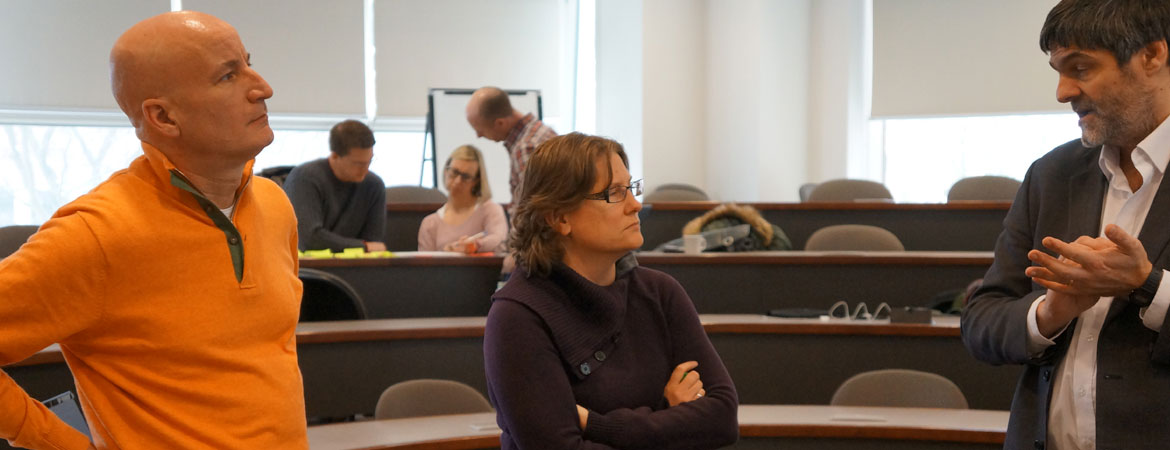Funded Research and Grants
Lazaridis Institute Funded Research
The Lazaridis Institute is dedicated to fostering innovation and supporting cutting-edge research that addresses the evolving challenges of high-tech enterprises. Our seed grant program empowers scholars to explore transformative ideas, push the boundaries of knowledge, and develop solutions that drive technological advancement and economic growth.
Below is a list of research projects funded through our seed grants, showcasing our researchers' diverse and impactful work across various fields. Suppose any of these topics resonate with your interests. In that case, we would like to encourage you to reach out directly to the principal investigators by clicking on their email addresses that are provided with their names. Your engagement is integral to the success of our research.
Anne Domurath, Nicole Coviello, and Holger Patzelt
Scalability as an Organizational Capability: Developing and Testing a new measure ($9,830)
Chun (Martin) Qiu and Fatih Yegul
AI Adoption in SMEs: Assessing the Impact of Large Language Models and Generative AI on Tech Firms in the Kitchener-Waterloo Region ($9,400)
Hae Joo Kim and Jee Hyuk Wi
Employees as Machines: Positive Perceptions of Dehumanized Service Providers ($10,000)
Fang Wang and Yijia (Vita) Cao
Virtual Persona Stereotype: Navigating Audience Perception Challenges toward Deepfakes ($7,370)
Xuan (Jen) Zhao
Understanding the Trade-Offs in Electric Vehicle Charging Infrastructure: Incentivizing Open Access to Tesla's Supercharging Network ($8,260)
Hae Joo Kim and Md. Zillur Rahman Siddique
The Effect of Visual Density on Perceived Environmental Impact of Sustainability Initiatives ($10,000)
Madhu Kalimipalli and Jin Wang
Technology Affinity and Climate Risk Propagation: Evidence from Bank Loans ($8,622)
Chatura Ranaweera and Jeeshan Mirza
Microfoundations of Customer Success Management: Frontline Employee Motivations, Competencies & Organizational Factors ($9,980)
Simon Taggar, Anne Domurath, and James Moore
Pivots in Technology Ventures: Implications for Perceived Entrepreneurial Person-Team Fit and New Venture Team success ($9,665)
Maryam Afzalabadi, Mojtaba Araghi, and Sara Babaee
Bridging the Skill Gap: Aligning Academic Curriculum with the Evolving Needs of the Canadian Tech Industry in Supply Chain Management (SCM) ($10,000)
Madhu Kalimpalli
Real effects of debt contracting ($7,596)
Jin Wang
Should firms avoid relying on key employees? Evidence from inventors ($9,003)
Jeeshan Mirza
Post sale customer value management in B2B technology firms ($7,388)
Chun (Martin) Qiu
Marketing creatives, generative AI, and AB testing ($5,248)
Catherine Lam
Skip-level participative leadership and employee performance ($$7,184)
Jie (Kassie) Li
Innovation progress management and its impact on team innovative performance ($9,216)
Sakshi Korde
Consequences of eco-anxiety: Coping from helplessness by adopting self-efficacy bolstering technology ($8,220)
How does political activism affect technology firms? ($10,000)
Fang Wang and Shan Wang
Creators' success: a social learning theory perspective ($10,000)
Ke Cao
The genesis and evolvement of organizational culture in international technology firms ($5,494)
Salar Ghamat
Incentive mechanisms for adoption of optional technological advancements ($9,977)
Mary Kelly
Board composition and investment in technology: evidence from insurance companies ($8,675)
Kelsey Kirbyson
When cash is king: an investigation of the effects of voluntary furloughs, compared to layoffs, in Canadian technology startups ($9,940)
Fang Wang
Conversational AI Agents: Capability Features and User Attitudes ($7,900)
Ali Anwar and Maria Rouziou
Salesperson resilience and learning from failure: The role of humble leadership ($8,780)
Anne Domurath and Simon Taggar
Goal orientation and entrepreneurial resilience ($9,805)
Pan Jiang and Si Li
Migrant population and the growth of mobile payments ($4,112)
Sakshi Korde and Tripat Gill
Impact of AI diagnosis and recommendations on patient compliance ($6,792)
Andrea Reaume
Effectuation and causation in NPD: Iterative, feed-forward relationships between action and performance ($2,550)
Christopher Wong, Joanna Andrejkow and Dorian Lane (University of Waterloo)
An examination of the effects of incentive type and recognition programs on remote worker productivity ($9,900)
Leslie Berger, Lan Guo, Michael Wynes, Zhuoyi Zhao
My badge, my honor: How gamification enhances employees’ resilience ($9,405)
Claudia Iglesias, Grant Packard (York University)
Communication modality in human-machine interactions ($5,620)
Steve Risavy, Chet Robie, Peter Fisher
Selection tool use in growth-oriented technology companies ($10,000)
Mehdi Jourabchi
Economic and environmental benefits of digital platforms connecting the trucking sector’s shippers and carriers ($6,750)
Tina Arabian
Servicizing business models: Addressing the economic and environmental risks ($3,295)
Sebastian Fourné, Sepideh Yeganegi
A dynamic perspective on high-tech ventures’ slack resource accumulation, usage and innovation in challenging institutional contexts ($10,000)
Ling Chu, Robert Mathieu, Chima Mbagwu
Non-GAAP disclosure in Canadian high tech companies ($5,700)
Ivona Hideg, Shira Mor (Ono Academic College, Israel), Frederic Godart (INSEAD), Yuval Engel (University of Amsterdam)
Tackling the gender gap in entrepreneurship: The role of benevolent sexist attitudes in under-funding of female-led ventures ($7,988)
Ammara Mahmood, Nir Vulkan (Oxford)
Impact of equity crowdfunding on product innovation and adoption ($9,705)
Bill Morrison, Bradley Ruffle
Do pre-filled online forms encourage more accurate reporting? ($10,000)
Hamid Noori
IoT-enabled business models in product-service systems ($5,000)
Simon Taggar, Anne Domurath
Developing scalable businesses: A study of a high-technology accelerator's outcomes ($9,814)
Ling Chu, Robert Mathieu, Chima Mbagwu, Ping Zhang (University of Toronto)
Non-GAAP disclosure in Canadian high tech companies ($10,000)
Hae Joo Kim
Hiding behind the screen: Screen size, guilt and impulsivity ($5,216)
Zhenfeng Ma
Product capability versus usability: Insights from a two-sided perspective of designers and users ($8,581)
Oliver Masakure, Patricia McLaren, Josephine McMurray
Building high growth firms in Canada: Profiles in courage ($8,702)
Rosemary McGowan, Eddy Ng (Dalhousie University)
Women in leadership pipelines in tech-intensive industries: Discourses of senior leaders, middle-level managers and MBA students ($8,367)
Hamid Noori, Constantin Blome (University of Sussex)
Building transient collaborative networks to help start-ups grow ($8,558)
Grant Packard
Conversation dynamics: The impact of when and how technology-mediated agents speak to customers ($8,346)
Brian Smith
'Smart' money: The role of networks and institutions in funding early stage growth ($9,990)
Simon Taggar, Anne Domurath
Shared leadership in high technology growth firms ($9,907)
Externally Funded Research
Numerous faculty members are engaged in research pertinent to the Lazaridis Institute. The following is a list of their research programmes funded by the Social Sciences and Humanities Research Council of Canada (SSHRC).

Ali Anwar (PhD Candidate, Marketing):
Salesperson Resilience and Learning from Failure. ($20,000)
Ke Kao (Strategic Management)
Using Sustainable Certifications to Scale-up Meaningful Changes in Businesses ($11,600)
Tripat Gill (Marketing)
Market Insight and Innovation ($25,000); The Role of Emotions in Innovation Adoption ($42,000)
Chatura Ranaweera (Marketing)
Investigating the Impact of Online Word of Mouth on Innovation Diffusion ($28,000)
Oliver Masakure (Business Technology Management)
Paths less traveled: Experiences of young African immigrant entrepreneurs - SSHRC Insight Grant ($48,283)
Leslie Berger (Accounting)
The Deterrence Effect of Tax Whistleblowing Programs - SSHRC Insight Development Grant ($61,547)
Stephen Risavy (OB/HRM)
Helping technology start-up companies grow: A focus on evidence-based hiring practice - SSHRC Insight Development Grant ($50,574)
Hae Joo Kim
Do smaller screens lessen guilt? A study on screen size, guilt, and consumer indulgence ($55,718)
Jin Wang, Hongping Tan, Li Yao
Corporate innovation and the information production by financial analysts ($94,126)
Sepideh Yeganegi, André Laplume
Parent firm disposition, hostility toward spinouts, and parent performance ($40,291)
Grant Packard, Jonah Berger
(Technology mediated) conversation dynamics ($61,089)
Nicole Coviello, Anne Domurath, Sarah Wilner
What lies beneath: How marketing capabilities and their micro-foundations shape innovation success ($135,205)
Tripat Gill, Zhenfeng Ma, Ping Zhao
The role of emotions in innovation adoption: Theoretical model and marketing applications ($164,618)
Zhenfeng Ma, Chatura Ranaweera, Kristof Coussement
Investigating the impact of online word of mouth on innovation diffusion: A multidimensional approach to capturing consumer online sentiment ($228,936)
Fabricio Perez, Andriy Shkilko
Price discovery and market fragmentation ($129,800)
Josephine McMurray, Heidi Sveistrup, Judith Sixsmith, Katherine Kuschel, Kerstin Ettl, Vesna Mandakovic
From exception to rule: The role of regional innovation ecosystems in the development of women entrepreneurs ($24,917)
Josephine McMurray, Jim Wallace, Chatura Ranaweera, Richard Booth
Mobile smart surveys: Does context matter when we share experience data with researchers? ($62,939)
Sarah Wilner
Speaking from experience: Investigating new means of evaluating experiential marketing campaigns ($60,870)
Grants
The Lazaridis Institute provides seed grants for early stage research projects (e.g., first round of substantial funding or designed to facilitate successive funding).
These internal grants are available to exclusively to faculty members and graduate students in the Lazaridis School of Business and Economics, however external collaborators may be included in the application.
Funded research broadly aligns with the mandate of the Lazaridis Institute. The activities we fund may include, but are not limited to:
- Developing, launching or testing a new research idea or approach.
- Conducting a feasibility study.
Details
- Amount: From $5,000 to $10,000
- Terms: 14 months (maximum)
- Who Can Apply: Lazaridis School faculty and graduate students (Note: graduate students should have the Approval of their faculty advisor)
- Applications for 2024-25 grants are due by 11pm on September 15, 2024.
- Please visit the Lazaridis Institute Research Page (self-registration) on MyLearningSpace to download and submit an application.
"The Lazaridis Institute for the Management of Technology Enterprises supports growth-oriented Canadian technology companies. We empower current and emerging technology firms to scale rapidly into globally competitive enterprises."
Accordingly, the Lazaridis Institute supports research pertinent to the management issues faced by high growth technology firms. We are particularly interested in research specific to the management challenges associated with scaling an organization through accelerated growth.
Applications for seed funding will support research projects that:
Create new and better ways of doing things in high growth technology firms (more efficiently or effectively, leading to greater impact).
Develop an evidence base relevant to the Lazaridis Institute mandate through developing and testing new and existing theories and ideas.
Respond to emerging issues in the global community of technology organizations.
Successful seed projects that produce meaningful evidence with proven results should be used by a grant recipient to subsequently apply for funding for a large, implementation-oriented project.
Eligible expenses include:
- Salaries and benefits for students, postdoctoral fellows or technicians not named as a grant applicant.
- Up to $750 of non-disposable equipment used to acquire data (e.g. digital recorder, tablet).
- User fees or subscriptions for service providers (e.g. AmazonMturk; transcription services).
- Materials and supplies, including data where necessary.
- Dissemination costs (including a maximum of one conference within the grant period).
- Travel (field work, archival work, collaboration, conferences).
Ineligible expenses include:
- Hosting workshops.
- Visiting faculty salary or support.
- Salaries and benefits for students, postdoctoral fellows or technicians named as a grant applicant.
- The content of the proposal for funding must be substantively different from other funds currently held or applied for.
- Requests must broadly align with the mandate of the Lazaridis Institute.
- The funds awarded are to be used only for the approved project.
- The funds are to cover out-of-pocket expenses associated with the research project.
- Seed funding is not intended to top-up an existing funded project.
- Seed funding is not intended to be a stipend for graduate student applicants.
- In addition, funds awarded to one project may not be transferred to another.
Researchers should complete the Lazaridis Institute Research Seed Funding Application including a budget and justification for funds requested.
Please submit all applications directly to the Lazaridis Institute Academic Director, Hamid Noori.
Applicants are required to:
- Clearly state their research problem.
- Provide an overview of relevant theory and framing arguments.
- Explain the research method and implementation plan.
- Explain how the research aligns with the mandate of the Lazaridis Institute.
- Outline the expected contributions for both research and practice.
- The alignment of the research with the mandate of the Lazaridis Institute.
- The importance of the research problems and thus, any potential contribution from a research perspective.
- The practical need for the project.
- The rationale for the budget and logic of the implementation plan.
- Whether the proposal is reasonable in terms of achieving the desired goals in a realistic timeframe.
All grantees will provide a final written report assessing their research and its outcomes. This report is due within 16 months of the award announcement. Please download and complete the report form.
Information required includes:
- Achievement against the grant.
- Costs incurred in accordance with approved budget.
- What was learned from the results of the project, and how the new knowledge was used and disseminated, including knowledge transfer to the classroom.
- Next steps regarding additional grant applications and related research.
Upon request, the grantee will provide the Lazaridis Institute with access to relevant documentation of results from the project for purposes of Lazaridis Institute analysis and aggregation of information. Examples include conference and publication details, published papers, white papers, etc.
These findings will help build the Lazaridis Institute base of knowledge, and allow applicants, other organizations, staff and students to learn from these projects.
Upon request, the grantee will share the abstract of the funded project and provide the Lazaridis Institute with access to contact details and Laurier website information on the grantee. The Lazaridis Institute will profile funded projects on its own website.


